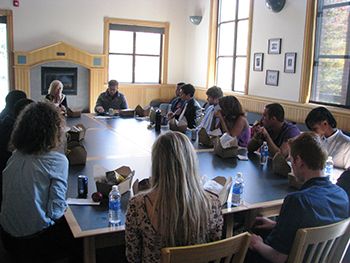Paula Kerger, President and CEO of PBS, the , visited the ĐÔ°®ÎĺÉ«Ěě, Reno Oct. 10 to speak with a dozen broadcast students about the future of public broadcasting. Afterward, students asked a variety of questions about Kerger's experience and how she has kept PBS relevant in the public eye.
Kerger became the President and CEO of PBS in 2006, emphasizing the network's need for education, diversity and use of technology. Her dedication to quality television has seen increased audiences nationwide and new programs including Downton Abbey, Daniel Tiger's Neighborhood and Curious George. She also initiated the PBS ARTS website and online video portals for audiences to watch PBS shows safely online.
"The opportunity to sit down to lunch and conversation with a national TV network president is the kind of transformative learning experience the University provides," Alan Stavitsky, dean of the Reynolds School, said. "Paula's experience and insight, when shared with Reynolds School students, helps them prepare for the future."
As she described to students during the luncheon at the , Kerger believes that the television industry is currently going through a major shift due to the decline of the Hollywood movie industry and an increase in high-quality storytelling on television and cable networks.
"This is such a great time for journalism," Kerger said. "Opportunities really are exploding. But it's a challenging time because there's no blueprint."
 Paula Kerger with journalism students.
Paula Kerger with journalism students.
PBS has remained relevant throughout this shift by being mindful of partnerships, focusing on content and paying attention to media platform adjustments. With these three strategies, as Kerger informed the students, a television network can remain aware of viewer needs. She highlighted this with the comparison of how the public can catch television shows they missed. Thirty years ago, viewers had to watch a program during its initial air time or wait for a rerun. Viewers today can watch shows on their own time with the assistance of a digital video recorder, or DVRs, or through online services such as Netflix, Hulu and television networks' official websites. She said that the networks that have not been mindful of this shift have fallen behind.
"We have to pay attention to our environment as it moves forward," Kerger said.
The environment of public broadcasting may also require partnerships to be forged. In particular, PBS has sought partnerships with Frontline, Pro Publica, New York Times, Univision and ESPN.
"PBS is not for breaking news, but to foster discussion," Kerger said. "Investigative journalists break the news - we pass on the information to engender discussion."
To improve the possibility of discussion from the featured PBS shows, Kerger has shifted the network's focus to her third and final strategy: developing distinctive content.
She encouraged journalism students to focus on stories that introduce important issues and explore new ideas. By focusing on relevant and useful content, she believes that viewership will take care of itself and a television network will remain profitable.
"Good content will draw people in to explore the ideas," Kerger said. "It will inspire creativity in all ages. Our shows may be for little ones to explore basics to get them to school or to encourage people to think about different ideas and open them up to ideas of science, arts, creativity in self, where you are in the world and what difference does it make."
Kerger concluded with the invitation for journalism students to pursue public broadcasting. She compared this to the students' memories of Mr. Rogers' Neighborhood, Arthur and Sesame Street, encouraging students to develop new popular shows that would be remembered by future generations like their own favorite childhood shows.
Following her University visit, Kerger attended the Aged to Perfection gala at the Silver Legacy Resort and Casino. Kerger was joined at the gala by past presidents of and Daniel Tiger, a PBS children's show host. The gala celebrated the 30th anniversary of KNPB, located on the ĐÔ°®ÎĺÉ«Ěě, Reno campus, and honored two longstanding members and contributors to the station, Gail and John Sande, III.
PBS is the nation's largest non-commercial media organization with 350 member stations, including KNPB, and features programs focused on arts, news and public affairs, and educational programming for all ages.










